Editorial
20A and dual citizen

The 20th Amendment to the J.R. Jayewardene 1978 Constitution was done and dusted on Thursday night with the Gotabaya-Mahinda Rajapaksa government comfortably clearing the two thirds majority barrier. Since President Gotabaya Rajapaksa’s election as the country’s seventh executive president in November 2019, nothing kicked up as much controversy as the 20th Amendment which the government was clearly intent on enacting despite, in our view, the far more important challenge of Covid-19 confronting our country and its people today. “First things first,” we said in this space last week, least expecting the powers- that-be to elevate the Covid nightmare above 20A on the national priority list. And so it sadly was, although the virus was spreading far too fast for comfort necessitating more and more stringent restriction in many parts of this island, particularly in the Western Province.
Government propagandists worked overtime to sock home the message that the president and the government elected some months after Gotabaya’s decisive victory had received a massive mandate and were fully entitled to press on with 20A. Although the present rulers came very close to getting what Junius Rex, the old fox who drafted the 1978 constitution, had calculated to be a never-attainable two thirds majority, they ignored the fact that neither President Rajapaksa nor his government said anything about a 20th Amendment in the manifestos they presented the country. There is not an iota of doubt that the people were very well aware that those who are now in office were ironclad in their ex post facto opposition to the 19th Amendment – despite all but one of them voting for its enactment. While it was clearly stated that the incumbents will bring a new constitution, the voters were never told that a 20th Amendment would be presented and passed in an almighty hurry. Claiming a massive mandate for doing what was accomplished last week was clearly not in order.
The 1978 constitution that established the proportional representation system of elections in place of the previous first-past-the-post Westminster model the country had followed since Independence, sought in vain to impose an anti-defection deterrent. It attempted to to ensure that MPs elected on party lists would lose their seats if they chose to defect. But this endeavor has proved to be a dismal failure. We’ve had a great many defections since then, with the numbers growing last week, but no single lawmaker who changed sides has lost his or her parliamentary seat. The less said the better about inducements and/or considerations that influenced switching allegiance. The people well know that there are no free lunches and many of the defectors have fed well, nay very well, at the trough. One of the Samagi Jana Balavegaya (SJB) members who voted for 20A was quoted in a newspaper saying she didn’t take even a cent for what she did. It sounded better in the original Sinhala – “sathayakwath gaththey ne, puluwan nam oppu karanna.” (I didn’t take even a cent, prove it if you can). Explaining her vote on the floor of the House on Friday, this National List lady said that she, like Antonio in Julius Caesar, “loved her country more” (than she loved her party)
This newcomer to politics was the so-called ‘owner’ of the SJB which was among the recognized political parties in the books of the Election Commission. When Sajith Premadasa and his supporters broke away from the green party, they acquired the SJB label to enable them to field their candidate list as a party at the last election. We do not know what the arrangement was, but Ms. Diana Gamage was included in the SJB National List after the election. Digressing from the thrust of this commentary, let us say here that the dozens of unknown or barely known political parties cluttering the Election Commission’s ‘recognized party’ register should be cleaned out as they have been and will be continue to be used for political expedience. The new system of elections promised in the next constitution, which the president says will be in place for his second election anniversary (November 2021), could ensure this.
To return to the subject under discussion, the dual citizen provision in 20A merits special mention. Nobody would dispute that particular provision in 19A clearly targeted the Rajapaksas – specifically Gotabaya and Basil, who were citizen of both Sri Lanka and the USA. It was clearly venal in intent. While Gotabaya renounced his US citizenship to run for president, braving a welter of legal challenges against his candidature and suffering many campaign disadvantages over the risk factor (would his candidature be annulled?), Basil Rajapaksa did not do so. Among the stalwarts of the SLPP-led alliance publicly denouncing doing away with the 19A provisions on dual citizen are three party leader-ministers, Vasudeva Nananayakkara,Wimal Weerawansa and Udaya Gammanpila. They are now on record saying that they were voting for 20A, including the dual citizen provision, on the basis of an assurance by the president that the new constitution to be enacted by November 2021 will retain the 19A prohibitions on dual citizen.
The unanswered question that remains hanging in the air is why a year-long window favoring dual citizen is being kept open if the prohibitions will be reimposed in the new constitution next year. Has any assurance been given that this opening will not be used? No answer was forthcoming during the 20A parliamentary debate. We believe that dual citizen should not only be prevented from running at presidential and national election but also not be permitted, with foreign allegiance, to assume any high public office in this country. Disgracefully, the authors of 19A during their previous tenure in government, started the rot by appointing dual citizen as ambassadors. The icing on the cake was appointing a Singapore citizen as Central Bank governor. He is now a fugitive of the bond scam investigation.
Editorial
Another arrest

Friday 28th March, 2025
The Commission to Investigate Allegations of Bribery or Corruption (CIABOC) arrested New Democratic Front MP Chamara Sampath Dassanayake yesterday over some alleged financial irregularities during his tenure as the Chief Minister of the Uva Province about nine years ago. The national anti-graft commission is often blamed for slumbering or netting sprats while sparing sharks when it deals with the corrupt. Its action against the likes of Dassanayake is welcome.
The CIABOC, however, should explain why it let the grass grow under its feet for so long before taking action against Dassanayake. Or, has it acted on a complaint made against him recently? If so, the complainant owes an explanation to the public as to why he or she took so long to move the CIABOC against him.
The presence of the likes of Dassanayake in politics has made the public think less of politicians. But it is difficult to get rid of such characters electorally because Sri Lankan voters are swayed by factors such as caste and patronage. Crafty politicians enter Parliament by leveraging pockets of support scattered across electoral districts. The Proportional Representation system has stood them in good stead; it enabled them to survive last year’s ‘maroon wave’.
It is being argued in some quarters that MP Dassanayake was arrested because he is at the forefront of the Opposition’s anti-government campaign, and the JVP/NPP government will have all its critics in Parliament arrested to suppress dissent. This argument is not without some merit, given Dassanayake’s scathing attacks on the government, and the sullied history of the CIABOC, which has blotted its copybook on numerous occasions by launching politically motivated investigations against the Opposition politicians, and opening escape routes for ruling party members who face legal action. So, the Opposition may be able to cast suspicions on the integrity of the CIABOC investigations against its members.
What we have been witnessing on the political front during the past several months resembles a replay of the early stages of the Yahapalana rule, which was characterised by numerous arrests. A large number of political rivals of the UNP-led Yahapalana government were summoned, questioned and arrested by the CID, which then bussed them to courts, some of which were kept open until midnight! Most of those suspects were remanded and prosecuted, but none of them were sent to jail.
Under the current dispensation as well, the police go hell for leather to make arrests, but most suspects obtain bail. It may be recalled that the CID went so far as to send a team from Colombo all the way to Beliatta to arrest former President Mahinda Rajapaksa’s second son, Yoshitha, in January 2025. It could have asked him to visit its headquarters and make a statement, or even arrested him in Colombo itself.
The police have also recorded a statement from Yoshitha over a recent nightclub brawl, where several persons described as his associates set upon a bouncer. Before last year’s elections, the JVP-led NPP had the public believe that it would take stringent action against all lawbreakers, especially the perpetrators of serious crimes. But today the NPP is floating like a bee and stinging like a butterfly in a manner of speaking. It said it had more than 400 files on various corrupt deals involving its political rivals. What has become of them?
Let the police be urged to concentrate more on probing grave crimes such as the assassinations of The Sunday Leader Editor Lasantha Wickrematunge and popular rugby player Wasim Thajudeen. If such emblematic crimes can be solved without further delay, the government will be able to ensure that some politicians currently out of power and their kith and kin are sent to jail.
Editorial
The ultimate test of patriotism

Thursday 27th March, 2025
Former President Ranil Wickremesinghe has reportedly said Sri Lanka’s economy still needs intensive care, and much more remains to be done to ensure its full recovery. He has emphasised the need for the incumbent government to tread cautiously on the economic front and secure foreign investment to sustain growth momentum. He has been critical of the manner in which prospective foreign investment in the power and energy sectors is handled under the current dispensation. Pointing out that investment and technology are driving the economies of countries such as China and India, he has called for measures to secure them to enable Sri Lanka’s economy to come out of the woods.
Contrary to the incumbent administration’s contention that its immediate predecessor under Wickremesinghe’s presidential watch did precious little to straighten up the economy, Wickremesinghe had the courage to make several highly unpopular yet vital decisions to resuscitate the economy. The JVP/NPP lambasted his approach to economic crisis management, and even resorted to ageist slur, calling him a ‘seeya’ (grandpa), who was not equal to the task of putting the economy back on an even keel, but ‘seeyanomics’, as it were, helped break the back of the economic crisis so much so that the JVP/NPP administration opted to continue with the last government’s economic recovery strategy as well as the IMF bailout programme.
Wickremesinghe’s unwavering political leadership for stabilising the economy, however, did not help boost his party’s electoral performance owing to his political wrongs, which were legion; he succumbed to the arrogance of power and unflinchingly defended the corrupt. Thankfully, the JVP/NPP has disappointed its critics who expected it to upend the IMF programme, advance its outdated Marxist agenda, and plunge the country into chaos again.
The SJB is critical of the manner in which the JVP/NPP government is handling the economy, and claims that it would have done much better if it had been voted into power. But it is of the view that the country has to stick to the IMF bailout programme, albeit with some changes, which, we believe, are not in the realm of possibility because Sri Lanka lacks bargaining power. Beggars are said to be no choosers. There is reason to believe that despite its rhetoric, the SJB would have had to do exactly what the JVP/NPP is doing at present in respect of the IMF programme and economic management if it had been able to form a government last year.
In the final analysis, President Anura Kumara Dissanayake, Wickremesinghe and Opposition Leader Sajith Premadasa see eye to eye on the need to ensure the continuity of the ongoing economic bailout programme. So, the question is why they do not sink their political differences and put their shoulders to the wheel to revitalise the economy.
After all, President Dissanayake during his talkathon on the final day of the budget debate in Parliament, last week, made a very passionate appeal. He said the government and the Opposition had differences and could take on each other to settle political scores, but they had to make common cause on the economic front for the sake of the country. One could not agree with him more. Political battles must not be fought at the expense of the economy. If only the JVP/NPP had practised what it is now preaching to its political rivals when it was in opposition.
Progress has eluded this country because successive governments have played politics with economic management instead of formulating national policies and strategies and adopting a consistent approach to economic management, the way India has done; the Indian economy has doubled to over $4 trillion during the past decade, according to latest IMF data.
The most effective way to build investor confidence and attract foreign investment is for the main political parties, their leaders, and other key stakeholders, especially Dissanayake, Wickremesinghe and Premadasa, to speak with one voice in respect of economic management and investment plans and strategies. Will they do so and prove that their much-avowed love for the country is genuine and not fake?
Editorial
Presidential blusters and legislators’ ire

Wednesday 26th March, 2025
The Opposition has taken umbrage at President Anura Kumara Dissanayake’s talkathon, as it were, in Parliament last Friday, when the final vote on Budget 2025 was held. Some SJB MPs have claimed that the Chair had their microphones switched off so that the President could hold forth uninterrupted, and he used the budget as an excuse for haranguing the House. The government MPs have sought to counter this argument. They insist that President Dissanayake, as the Minister of Finance, only exercised his constitutional right to address the House on the final day of the budget, and there was nothing wrong with it whatsoever.
There have been numerous instances where the legislature became a captive audience for the Executive Presidents—and even loquacious Prime Ministers and Opposition Leaders. Sri Lankan politicians have a propensity to talk nineteen to the dozen just to hear their own voice. However, there is more to the recurrent argy-bargy over presidential grandstanding in Parliament than the Opposition’s aversion thereto; the tendency of the Executive Presidents to subject the legislature to their loquacity can also be seen as symptomatic of the erosion of the separation of powers.
What has fuelled the ongoing campaign for the abolition of the executive presidency is that the Presidents tend to act like harum-scarum private bus drivers when they have control over Parliament. They tend to bulldoze their way through. The situation becomes even worse when the Presidents’ parties happen to have supermajorities in Parliament.
The Executive Presidents are compelled to act with some restraint when parties other than their own gain control over the legislature, as evidenced by the experiences of President D. B. Wijetunga from August to November 1994, President Chandrika Bandaranaike Kumaratunga from 2001 to 2004, and President Maithripala Sirisena from October 2018 to November 2019. Presidents J. R. Jayewardene, Mahinda Rajapaksa and Gotabaya Rajapaksa, by virtue of being the leaders of the ruling parties with supermajorities, reduced the Legislature to a mere appendage of the Executive. President Ranasinghe Premadasa also did likewise although his party did not have a two-thirds majority in Parliament. This unwholesome practice has continued over the years without a hiatus.
The constitutional requirement that the Executive Presidents attend Parliament once every three months, along with their power to address the legislature and hold Cabinet portfolios, has enabled them to dominate—if not undermine—the legislature. Some Presidents have leveraged their power to address Parliament to project their authority and overshadow legislators. One may recall that the last Parliament had the then President Ranil Wickremesinghe walking in, making speeches, and even asking some Opposition MPs to shut up.
The JVP, a bitter critic of the executive presidency, has pledged to abolish it. Its leaders made their support for Mahinda Rajapaksa in the 2004 presidential race conditional to his pledge to scrap the executive presidency. He, true to form, reneged on his promise. The JVP was also instrumental in having the 17th Amendment and the 19th Amendment to the Constitution introduced to curtail the powers of the Executive President. The 21st Amendment, which did away with some of the presidential powers, restored by the 20th Amendment, was also introduced partly due to JVP’s pressure exerted through Aragalaya (2022). Unfortunately, the Constitutional Council, which was created to fetter the excessive executive powers of the President, has become a rubber stamp for the Executive.
Today, the JVP has a two-thirds majority in Parliament and boasts of having expanded its support base across the country. Curiously, not much is heard about its pledge to abolish the executive presidency.
During an interview with the government-controlled ITN, on 04 Dec., 2024, in answer to a question about the JVP’s promise to scrap the executive presidency, JVP Central Committee member, legal advisor and Deputy Minister Sunil Watagala, said that the JVP/NPP leaders would not be able to conduct another presidential election campaign ‘with their clothes on’ as they had pledged to abolish the executive presidency on a priority basis.
Whether the JVP/NPP leaders will care to carry out their promise to abolish the executive presidency expeditiously or make another Machiavellian about-turn and conduct their party’s next presidential election campaign—with or without their clothes on—remains to be seen. What they should do urgently is to ensure that the President not only respects the doctrine of the separation of powers but also is seen to do so by refraining from subjecting Parliament to boastful bluster and snide remarks. They laid into the previous Presidents for haranguing Parliament, didn’t they?
-

 News5 days ago
News5 days agoSeniors welcome three percent increase in deposit rates
-

 Features5 days ago
Features5 days agoThe US, Israel, Palestine, and Mahmoud Khalil
-
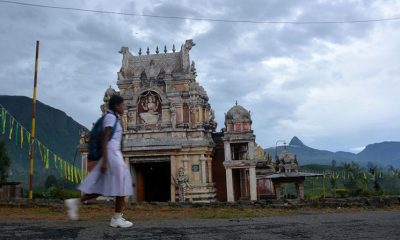
 News5 days ago
News5 days agoScholarships for children of estate workers now open
-
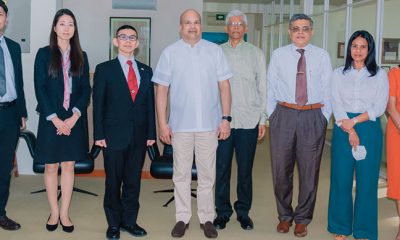
 News6 days ago
News6 days agoDefence Ministry of Japan Delegation visits Pathfinder Foundation
-
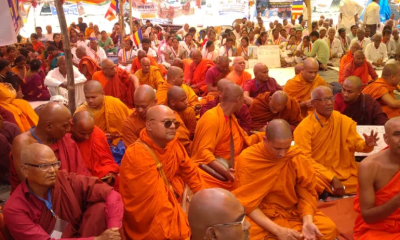
 Foreign News4 days ago
Foreign News4 days agoBuddhism’s holiest site erupts in protests over Hindu ‘control’ of shrine
-
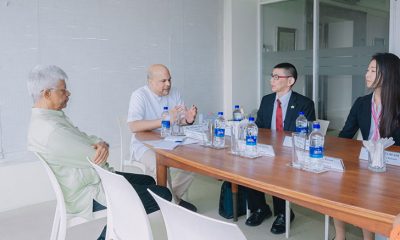
 News5 days ago
News5 days agoJapanese Defence Delegation visits Pathfinder
-

 Editorial6 days ago
Editorial6 days agoWhen promises boomerang
-
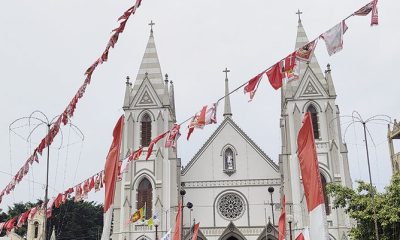
 News6 days ago
News6 days agoBan on altar girls upsets nuns, stirs talk on women’s church roles











